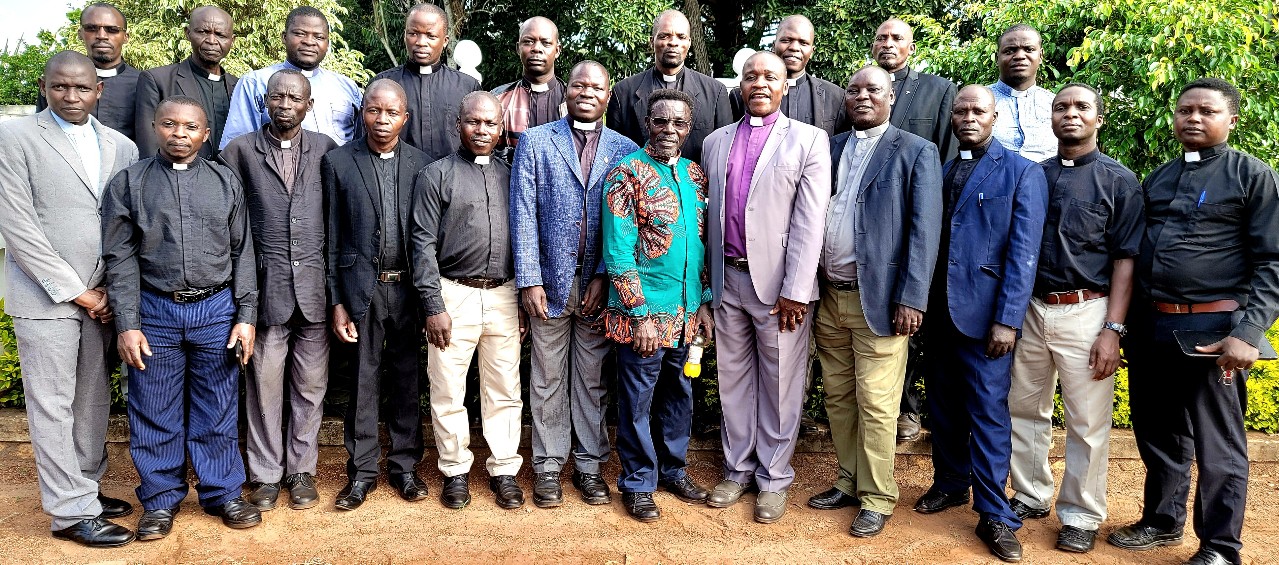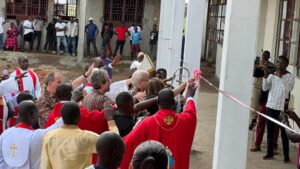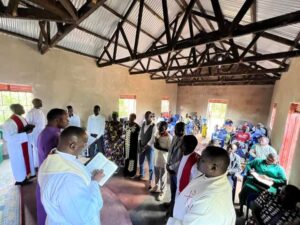
The Lutheran Church of Uganda (LCU) is an energetic Church Body that has grown over the years through the power of the Holy Spirit since it was planted in 1994 by the Evangelical Lutheran Church of Ghana (ELCG), working in partnership with the Lutheran Church Missouri Synod (LCMS).
The LCU has over 150 congregations/preaching stations—some meet in buildings and some meet under mango trees but all belong to the Body of Jesus Christ!
• There are two congregations in Kampala, one meeting a community called Bunga and the other Kansanga next to Kampala International University.
• The LCU is a national Church Body with congregations in all 4 regions of the country: Northern, Eastern, Central and Western. Significant clusters of congregations can be seen in the list below. The LCU operates in 28 of the over140 districts in Uganda. The LCU works in 13 of the approximately 42 language groups in Uganda.
• The highest local authority of LCU is the Delegates Conference. It comprises of representatives from LCU member congregations. The conference meets once every Four years to deliberate on major policies and issues of the church, to consider constitutional amendments and to elect officers to serve on the National Synod Board of Trustess (NSBT).
The Current National Synod Board of Trustess comprise of 18 members: They include;
o National Presiding Bishop who is elected from the Colloge of Clergy
o Secretary to the house of Clergy
o Three People from the House of Laity.
- Chairperson- House of Laity
- Vice Chairperson – House of Laity
- Secretary – House of Laity
o Seven Deans representing each Deanery
o Two members from the Women League
- Chairperson
- Secretary
o Two Members from the Youth League
- Chairperson
- Secretary
o Two Ex-Officials
- National Synod Coordinator
- National Treasure
Table Showing Members of National Synod Board of Trustess (NSBT)
| POSITION | NAME(S) |
| Presiding Bishop | Rt. Rev. Charles Isabirye Bameka |
| Vice Chaierperson (NSBT) | Mr. Fred Magezi |
| Secretary, College of Clergy | Rev. Enoch MacBen |
| Member | Mr. Nandubhu Paul |
| Member | Kidde Johnson Mugalu |
| Dean Mid- Western Deanery | Rev. Raymond Kaija |
| Dean – Eastern Deanary | Rev. Peter Maganda |
| Dean – North Eastern Deanery | Rev. Moses Lokong |
| Dean – Northern Deanery | Rev. James Okello Odoo |
| Dean – Central | Rev. Paul Sserwaniko |
| Dean – South West | Rev. Benson Barahuka |
| Dean – Far Eastern Deanery | Rev. Nicholas Bwire |
| Woman Leader | Mrs. Eugenia Buseruka |
| Women Representative | Mrs. Layet Dorothy |
| Youth Leader | Waiswa William |
| Youth Represe Representative | Miss Kayanga Phiona |
| Ex Officials | |
| National Synod Coordinator | Rev. James Okello Odoo |
| National Treasure | Vacant |
• There are 17 LCU seminary-trained-and-certified ordained pastors
• The LCU has had a three seminary trained-and-certified men sent by the ELCG over the years, including: Evangelist Solomon (and Georgina) Ayagri, Evangelist John Donkoh, and Rev. Isaac Gyampadu.
• The LCU has many lay-leaders who lead worship and preach week-in and week-out. Many lay-leaders are commissioned as evangelists and serve as congregational pastors.
• Many lay-leaders are trained on a monthly basis at one of 7 Mission Training Centers (MTCs) located in: Ibanda, Masindi, Lira, Busia, Iganga/Jinja, Amudat and Kampala. Lay-leaders who prove themselves at the MTC level may be nominated to receive advanced training through Theological Education by Extension (TEE) which meets twice per month in Kampala and has a 2-year curriculum. Successful completion of TEE qualifies a man to apply for seminary but many will continue to serve with distinction in their local context.
• The LCU has 7 men studying at the seminary of the Evangelical Lutheran Church in Kenya (ELCK) in Matongo and 9 students at Lutheran Theological Seminary in Tshwane, Pretoria, South Africa. Needless to say, we are eager for them to complete their studies and join the work.
• The Lutheran Church Missouri Synod, St. Louis USA, LCMS, has an informal partnership with the LCMU through the LCMS World Mission department.
• Currently LCMU is not served by any fulltime missionary from LCMS or ELCG.
• The LCMU is by far and away the largest Lutheran Church body in Uganda. It also has the longest track-record. (Others sometimes claim they were the first Lutherans in Uganda—also planted in 1994. Their claim only has merit if they admit they broke away from (or were sent away from) the ELCU. LCMU is the only Lutheran Body that has enjoyed a continuous and unbroken relationship with the LCMS and the ELCG all the way back to 1994.
• Many Christians from Australia and USA have had meaningful relationships with the LCMU over the years—usually thru congregationally-based, short-term Mission teams. This includes, in no particular order:
o With God’s Little Ones, St. Charles, MO
o Hope Lutheran Church, Lubbock, TX
o Messiah Lutheran, St. Charles, MO
o Immanuel Lutheran, Brookfield, WI
o Trinity Lutheran (Freistadt), Mequon, WI
o Trinity Lutheran, Roselle, IL
o Good Shepherd Lutheran Church, Para Vista, Australia
o Gloria Dei Lutheran Church, Urbandale, Iowa
o Vestavia Hills Lutheran Church, Alabama
o First Lutheran Church, Glencoe, MN
o Resurrection Lutheran Church, Cary, NC
o Hearts and Hope, St. Louis, MO
• There may be up to 5 Lutheran church bodies in Uganda but the LCMU is one of a few Lutheran church bodies in Uganda considered to be legitimate by the Lutheran Communion for Central and Eastern Africa (LUCCEA), a regional accrediting agency based in Nairobi at the All African Churhces Building.
LUTHERAN MEDIA MINISTRY UGANDA
The Lutheran Media Ministry – Uganda (LMMU) was established in I995 with the introduction of “This is the Life” weekly Lutheran Hour Ministry episodes on Uganda Television.
LMMU is an affiliate of Lutheran Hour Ministries and enjoys a close, fraternal relationship with the LCMU. The LMMU Director, Rev. Charles Bameka, is also the Vice President of the LCMU.
Though administered and governed independent of the Lutheran Church Mission, the Lutheran Media Ministry works in partnership with the Lutheran Church Mission in Uganda, thus contents of all its programs produced reflect the mission concerns and the confessional beliefs held by the Lutheran Church Mission in Uganda. LMMU fulfils its mission by;
a. Producing contextual Christian programs for outreach.
b. Coordinating the on going ministry of the Churches in Uganda particularly the Lutheran Church.
c. Developing effective programs for follow-up ministry on the referrals sent to the congregations in coordination with the local congregations and preaching stations.
Lutheran Media Ministry is a very good and effective tool for evangelism and must be encouraged and supported by the Lutheran family hear and overseas.
The ministry among it many benefits;
(i) assists the church in rural and urban ministry in their evangelistic efforts.
(ii) helps establish a proper communication system between member churches, preaching stations and the public at large.
(iii) help in producing religious materials for radio and television programs.
(iv) helps promote the young Lutheran Church in Uganda.
(v) helps in training for evangelism and follow-up through the ‘Equipping the Saints Program’.
CONCLUSION There has been struggles, pain and hardships in the birth of the Churches, but success has been possible because the Holy Spirit has worked through the gifts and talents of many men and women who have dedicated their time and resources for the service of God and Others. The challenge promise of Christ is as relevant today as it was in the New Testament tiems. He says, “I will build my church and not even death will ever be able to overcome it” Matt . 16:18b.
Our only goal in to proclaim Christ Jesus and bring many unbeliever to his church while strengthening the faithful with Word and Sacraments. Amen.
Since 2001, ‘Equipping The Saints’ (ETS) workshops have equipped many men and women, including Board Members for both the Lutheran Media Ministry Uganda (LMMU) the local LHM office and the Lutheran Church Mission in Uganda (LCMU). Over the last 7 years, more than 350 men and women have been equipped and are out their in the field proclaiming the Gospel in their communities and serving as LMMU’s ambassadors. ETS is a worldwide initiative of the Lutheran Hour Ministries (LHM) that aims at Equipping, empowering and getting Lutheran laymen engaged in serving the church. Each fiscal year, LMMU holds four ETS workshops regionally on a quarterly basis, to empower Lutherans in Uganda with the skills and Knowledge to enable them to extend LHM ministry allover the country starting with their congregations and communities. During the Equipping The saints workshops, seven module reflecting three LHM’s major initiatives of; “Equip, Engage and Proclaim” are shared.
In the last quarter, LMMU’s Equipping the Saints workshop took us to Amudat, Nakapiripirit District – Northeastern Uganda boarder with Kenya close to 500 km from Kampala. The trip started at 8:00 am and after 8 hours of driving, we arrived at Amudat Lutheran Parish to a welcome songs and ‘up-and-down jump dance’ by a group of twelve comprising of five men and what a group of ‘what seemed like young girls carrying their mothers’ children’. Learning how to greet in Pokot language since most of the people could not speak English. A while later we learnt that the ‘girls’ were ‘real’ mothers carrying their own children.
As we went through the program for the trip, we leant from Rev. Moses Lokong that the non resident participants would arrive for the ETS workshop the next morning at 10:00 am. When the Director LMMU, Charles Bameka inquired why participants would arrive later than the usual 8:00 am for the workshop, our team was told by Boaz Kapyen that; “the Pokot as well as Karimajong women act as role models to their households. They are required by culture to perform all the household work, including grazing and tethering goats, tilling the land, cooking the day’s meal before they can move out of their homes. Failure to perform these duties, their husbands who spend most of their day at the drinking places will bit them up.” The following day all participant did not gather not until 11:30 am when the workshop started.
According to Kapyen, the participants had to foot at least 4 kilometers to reach the workshop venue. In Amudat, Nakapiripirit District, the road network is not yet developed, there are no buses or taxis for quick travel most of the travel is by foot through the many winding bush paths. Nevertheless, the facilitators utilized the five hours, which were left to teach, since the participants had to retire by 5:00pm to be able to walk the long distances back to their huts home.
When it came to lunch time, the facilitators expected the meal to be ready, however, they were reliably informed that due to food scarcity, the Pokot people normally eat one meal between 3:00 pm and 5:00 pm. At 3:00 pm, meal time, men sat in a group separately on wooden benches and stools while the women, youths and children sat under the trees on the grass. Some of the women were singing before they could join their friends. Meals were served at 3:30 pm serving men first and when it came to the distribution of sodas only men received a bottle. The Director LMMU realized that women and children were not taking drinks and when he inquired, he was told that it was normal a normal practice that only men take sodas as it was expensive to buy sodas for all family members. The Director requested the LMMU facilitators to work with him to distribute the remaining soft drinks in the store to all the women including kids who had followed their mothers, some of the men were surprised by this action.
Women emancipation is not yet in practice in this region. The female sex is greatly marginalized. In Amudat region and Karamoja as a whole, it is normal for the women to go hungry as long as the men have had their share. Girls in this region marry when they are as young as 13 years and are kept in subordination to men. The women of Amudat are very energetic and active both in their homes and in the church. They have embraced the gospel, are active in evangelism, and only need a platform to give them a voice to speak and be heard by their male counterparts.
There is a high level of illiteracy and out of the 58 participants only 7 could speak English, while only a few could write the Pokot local language. Thanks to Rev. Lokong Moses and Mr. Kiralem Elijah, a teacher by profession and a member of the Pokot language translation team at the Ministry of Education and a member of the Lutheran Church in Amudat, who were the interpreters throughout the entire workshop.
Faced with such other hindrances as traditional beliefs as divination, in their homes or neighborhood, yet they must carry on the gospel of Christ. Mr. Joel Lowoyan of Alapat Lutheran church reported that several times he was chased away from peoples homes while on visitation in his village. He was later accused before the elders of Alapat villager for bringing into the community a foreign God who apposed their traditional faith and practices and he was flogged. The people of Northeastern Uganda, especially Amudat parish, need God’s intervention. We need to be zealous when reaching these people though with hardship and challenge.
The workshops focused at helping the participants understand and interpret the LHM’s Mission and outreach programs and activities in Uganda, working in partnership with the Lutheran church Mission in Uganda. More training is badly needed to equip more volunteers to carry out the works of evangelism in Amudat region among the 8 Lutheran Churches in the region. However, it is hard to find educated people to implement the ministry programs such as BCC and make evaluative reports. Fortunately, the Pokot live in clustered settlements, which will simplify the visitation exercise.
Over the last two quarters, 106 participated in our ETS workshops and 79 graduated. These are expected to be joining hands with our District facilitators to distribute BCC, carry out visitations, follow-up and connecting respondents to the local churches. Over the last two quarters, ETS graduates have witnessed to 575 individuals. We thank God for their volunteer service to LMMU.






